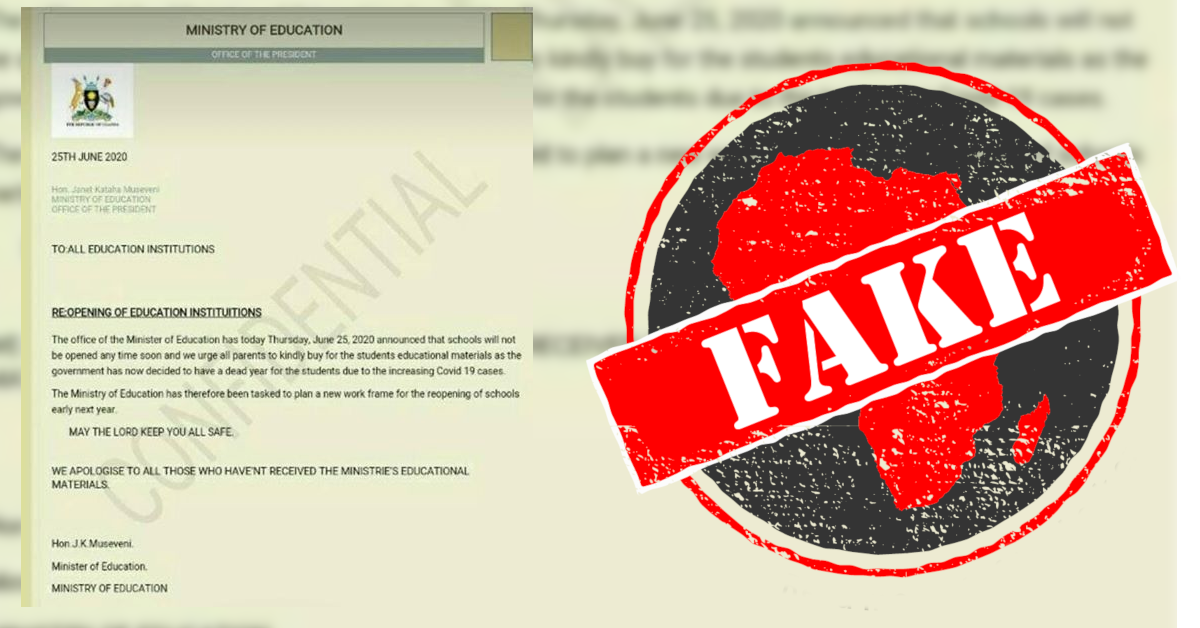A post on Facebook claims that the Uganda Red Cross Society is recruiting 50 people in every district of the country.
It includes a link to a Google Form with further instructions on how to apply for the jobs. It also claims salaries start at USh940,000.
It’s unusual for organisations and companies to recruit on Facebook posts and online forms. We checked if the Uganda Red Cross does things differently.

The job advert, from 22 January 2020, does not appear on the official website of the Uganda Red Cross. That’s a red flag the information is fake.
And just like many other fake job ads debunked by Africa Check, this ad says a “registration fee” must be paid for an application to be processed. Applicants are asked to pay USh21,000.
Most companies we have consulted said they did not charge any fee during any part of their recruitment processes.
The Uganda Red Cross has warned the public against getting conned through its official Facebook and Twitter pages.
On 18 February it said on Facebook: “Uganda Red Cross does not advertise Jobs through Social Media, or contract any third party to advertise jobs on our behalf. Our vacancies are only advertised through the Newspapers and on the official Uganda Red Cross website.”
The Uganda Red Cross also confirmed they do not charge money when recruiting staff: “Please disregard any invitations from fraudulent sources calling for mass recruitment and payments solicited through any mobile money number.” – Dancan Bwire
It includes a link to a Google Form with further instructions on how to apply for the jobs. It also claims salaries start at USh940,000.
It’s unusual for organisations and companies to recruit on Facebook posts and online forms. We checked if the Uganda Red Cross does things differently.

Jobs not advertised elsewhere
The job advert, from 22 January 2020, does not appear on the official website of the Uganda Red Cross. That’s a red flag the information is fake.
And just like many other fake job ads debunked by Africa Check, this ad says a “registration fee” must be paid for an application to be processed. Applicants are asked to pay USh21,000.
Most companies we have consulted said they did not charge any fee during any part of their recruitment processes.
‘We do not charge any money’ – Red Cross
The Uganda Red Cross has warned the public against getting conned through its official Facebook and Twitter pages.
On 18 February it said on Facebook: “Uganda Red Cross does not advertise Jobs through Social Media, or contract any third party to advertise jobs on our behalf. Our vacancies are only advertised through the Newspapers and on the official Uganda Red Cross website.”
The Uganda Red Cross also confirmed they do not charge money when recruiting staff: “Please disregard any invitations from fraudulent sources calling for mass recruitment and payments solicited through any mobile money number.” – Dancan Bwire
Republish our content for free
For publishers: what to do if your post is rated false
A fact-checker has rated your Facebook or Instagram post as “false”, “altered”, “partly false” or “missing context”. This could have serious consequences. What do you do?
Click on our guide for the steps you should follow.
Publishers guideAfrica Check teams up with Facebook
Africa Check is a partner in Meta's third-party fact-checking programme to help stop the spread of false information on social media.
The content we rate as “false” will be downgraded on Facebook and Instagram. This means fewer people will see it.
You can also help identify false information on Facebook. This guide explains how.


Add new comment